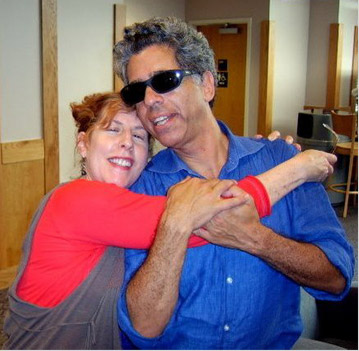

Testaments of the Heart:
A Conversation with Honora
and Dahlan Foah
By Mary Davis
Copyright © 2011
The Foahs live in a big, older home in a historic Atlanta
neighborhood. Their front door is wide open to catch the
breeze on this day in September when the intense heat of
summer has broken. I walk right in and find Honora and
Dahlan in their light filled kitchen surrounded by tall, leafy
trees outside. We take our espresso and tea and sit around the kitchen table by the windows for this conversation.
Several weeks after this interview, Honora and Robert
Dahlan Foah and the Mythic Imagination Institute™ team, in partnership with Emory University’s Center for Ethics are
producing a concert at Emory University featuring works
collected by Professor Francesco Lotoro, an Italian pianist,
composer, conductor and professor. These works are
original music written by composers during their
imprisonment in concentration and internment camps during the Holocaust. Many of these composers were murdered in these camps.
The major theme for this Mythic Imagination Institute™
initiative is “Creativity in Captivity.” The title of the initial
concert and its accompanying art exhibit is “Testaments of
the Heart.” The goal of today’s conversation is to discuss the
source of the Foahs’ inspiration for this initiative.

Mary Davis (MD): What was your starting point with
Professor Lotoro?
Dahlan Foah (DF): About three years ago, I was the
Assistant Conductor of the Atlanta Community Symphony
Orchestra, and Conductor Juan Ramirez gave me an article
from the press (I think USA Today)about Professor Lotoro,
and at the same time, my father, Mario Foah, sent me the
same article.
I was going to Italy soon, and I tried to contact Professor
Lotoro. He lives in Barletta, south of Rome. I contacted
Lucio Ivaldi, a choral conductor in Rome, and asked him to
set up a dinner meeting in Rome with Professor Lotoro.
So, Honora and I, Lucio, and Daniel Schene (Honora’s
brother who is a concert pianist and professor in the U.S.)
had dinner with Professor Lotoro two blocks away from
Vatican City. Lotoro’s publisher (KZ Musik) was located
nearby. It is an interesting coincidence that the Vatican was a few steps away. So, we met with him and decided we wanted to bring him over to the United States.
MD: Why were you interested?
DF: I have known many survivors, I was brought up with
many survivors. But the idea of the music drew me in; the
seeming impossibility of writing music under these
circumstances. And Francesco Lotoro is a very animated and impassioned scholar. He studied piano with Aldo Ciccolini.
MD: Will you tell us something about your Italian and
Jewish ancestry?
DF: My great grandfather was the Rabbi of Naples. On my
maternal side, my grandmother was a concert pianist who
was employed as a sort of court pianist for Mussolini. Her
husband was Secretary to the Ambassador of the King of
Aftghanistan. Their world was featured in the film, “The
Garden of the Finzi – Continis.” My mother was first in her class in art at Cooper Union in
New York City.







